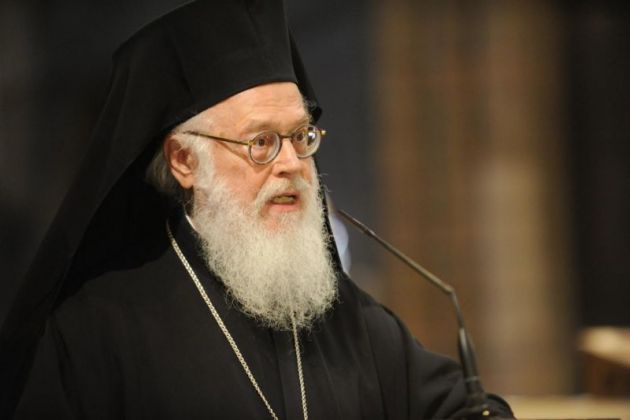Greek-born Archbishop Anastasios of Tirana dies at 95

Anastasios Yannoulatos, Archbishop of Tirana, Durrës, and All Albania, has died at the age of 95 in Athens, Greece.
The quiet-spoken bishop was an influential catalyst in the Orthodox world and a giant in the ecumenical sphere, the World Council of Churches reported on Jan 25.
Archbishop Anastasios died after a short illness on Jan. 25.
Anastasios was born in 1929 in Piraeus, Greece.
An honorary member of the Academy of Athens and a former World Council of Churches president, with more than six decades in the ecumenical movement, Anastasios was known as a herald of peace and wisdom worldwide and a champion of interreligious dialogue.
"Today we remember and honor not just the intellectual and institutional achievements and ecumenical dedication of Archbishop Anastasios," said WCC general secretary Rev. Jerry Pillay, "but also his wonderful, warm spirit, which enabled him perennially to open channels of reconciliation, renewal, and dialogue, even and especially in difficult times and venues.
"He leaves our worldwide fellowship an inspiring and enviable legacy as a true Christian witness for peace, justice, and reconciliation."
Anastasios's career in the ministry spanned more than 60 years.
His early ministry was in Greece and Africa, then he led the Orthodox church in Albania after it endured virulent anti-religious decades as part of the Soviet bloc.
This entailed overseeing the building of churches and educational institutions in post-1989 Albania, reframing and renewing missions in an Orthodox world that sometimes eschewed it, and championing peace and ecological justice in this century.
WCC moderator Bishop Heinrich Bedford-Strohm said: "With the death of Archbishop Anastasios, so many of us have lost a personal friend.
"As a fellow bishop, I have also admired his indefatigable work as a bridge-builder and reconciler among the Orthodox churches in Europe and beyond, especially in the decades after the Cold War and up to our present day."
Bedford-Strohm said the work of Anastasios was invaluable in an era when conflicting national, economic, and political interests and loyalties threatened global unity.
- Mild manner, bold leader
Anastasios's personal kindness, mild manner, and openness to learning from a variety of traditions and points of view made him a natural ecumenist and a progressive force in interreligious and missiological circles, according to a WCC statement.
He served as a member of the WCC Commission on World Mission and Evangelism (CWME, 1963-1969) and on its missionary studies committee, then as secretary for missionary research and the relations with the Orthodox churches in the WCC General Secretariat (1969–71).
He then participated in the WCC program on Dialogue with People of Living Faiths and Ideologies (1975–1983) and as moderator of the CWME (1984–1991), as a member of the WCC central committee (1998–2006), and as a president of the WCC (2006-2013).
Archbishop Anastasios was an active participant in the planning and convening of the autocephalous Orthodox churches in their Holy and Great Council in June 2016, capping decades of his inter-Orthodox work.
Under his leadership, the Orthodox church of Albania hosted many interdenominational meetings at the Academy of Saint Vlasios. Anastasios also initiated the establishment of the Interreligious Council of Albania (KNFSH), aiming to promote dialogue and the harmonious coexistence of religious communities.
Along with dozens of medals and awards, the archbishop was awarded 19 honorary doctorates.
- Prolific theologian
A prolific theologian and author of two dozen books in several languages, Anastasios is perhaps best known for tackling interreligious issues and dialogue, as in his 2003 volume Facing the World: Orthodox Christian Essays on Global Concerns (WCC Publications, 2003).
His early experience in Africa led him to re-envision the whole enterprise of mission in his 2007 volume Mission in Christ's Way (WCC Publications).
In his most recent book, Coexistence (published in six languages in 2022), he offered reflections on war, poverty, terrorism, corruption, injustice, globalization, and an alternative vision.
"It is our duty to not surrender to a passive observation and description of these consequences, but on the contrary, we should strive for a globalization of peace, solidarity, and love," he said.
"For many, this seems utopian, nevertheless, it remains the vision, desire, and struggle of those who still believe in the vital need for a universal harmonious coexistence which does not eliminate the uniqueness of peoples but which creatively utilizes their talents."
- A life beyond borders
After graduating from the National University of Athens in 1952, he carried out post-graduate studies in the history of religions, ethnology, missions, and Africanology at the Universities of Hamburg and Marburg.
He was ordained in 1964, earned his doctorate from the National University of Athens in 1970, and was consecrated Bishop of Androussa, Greece, in 1972.
He served as a professor of the History of Religions at his alma mater from 1971 to 1997.
Anastasios also served as acting archbishop of the Holy Archbishopric of Irinoupolis (Kenya, Uganda, Tanzania) from 1981 through 1991 before being assigned to the newly independent Albania, where he was consecrated Archbishop of Tirana and Primate of the Autocephalous Orthodox Church of Albania in 1992.
As archbishop, he restored and further developed the Orthodox Church of Albania, which had been fully dissolved for 23 years.
He also led innovative programs in the areas of health, social welfare, education, agricultural developments, culture, and ecology, making the church a significant economic and cultural actor. At the same time, he struggled to assist in relieving the many tensions in the Balkans.
Characteristically, in 2015 he hosted the Global Christian Forum consultation in Tirana.
There, 150 high-level leaders and representatives of various church traditions from more than 60 countries gathered to listen and learn, and to stand in solidarity with churches and Christians experiencing discrimination and persecution in the world today
"It's the fruit of our work together in Albania," said Anastasios.